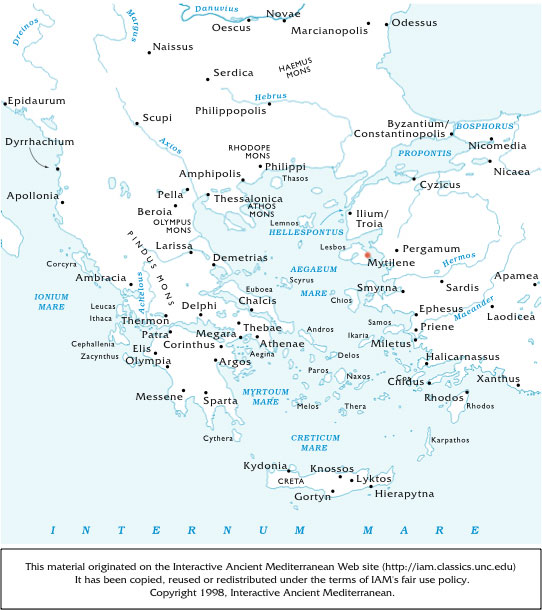
Mytilene
The chief city of Lesbos, stood on the east side of the island opposite the coast of Lesbos, upon a promontory which was once an island, and both sides of which formed excellent harbours. Its first foundation is ascribed to Carians and Pelasgians. It was early colonized by the Aeolians. Important hints respecting its political history are furnished by the fragments of the poetry of Alcaeus, whence (and from other sources) it seems that, after the rule and overthrow of a series of tyrants, the city was nearly ruined by the bitter hatred and conflicts of the factions of the nobles and the people, till Pittacus was appointed to a sort of dictatorship, and the nobles were expelled.
Meanwhile, the city had grown to great importance as a naval power, and had founded colonies on the coasts of Mysia and Thrace. At the beginning of the seventh century B.C. the possession of one of these colonies, Sigeum, at the mouth of the Hellespont, was disputed in war between the Mitylenaeans and Athenians, and assigned to the latter by the award of Periander, tyrant of Corinth. Among the other colonies of Mitylené were Achilleum, Assos, and Antandrus.
Mitylené submitted to the Persians after the conquest of Ionia and Aeolis, and furnished contingents to the expeditions of Cambyses against Egypt and of Darius against Scythia. It was active in the Ionian revolt, after the failure of which it again became subject to Persia, and took part in the expedition of Xerxes against Greece.
After the Persian War it formed an alliance with Athens, and remained one of the most important members of the Athenian confederacy, retaining its independence till the fourth year of the Peloponnesian War (B.C. 428), when it headed a revolt of the greater part of Lesbos, the progress and suppression of which forms one of the most interesting episodes in the history of the Peloponnesian War. This event destroyed the power of Mitylené. Its subsequent fortunes cannot be related in detail here. It fell under the power of the Romans after the Mithridatic War. See Leithäuser, Der Abfall Mytilenes von Athen (1874); Cichorius, Rom und Mytilene (Leipzig, 1888); Conze, Reise auf der Insel Lesbos, and Lesbos.
(Harpers Dictionary of Classical Antiquities, 1898.)
